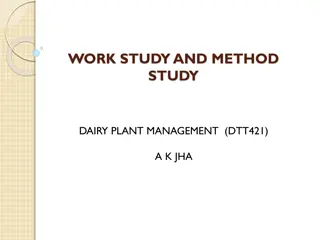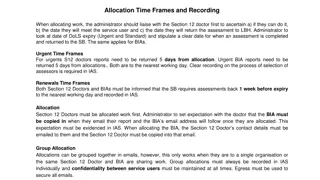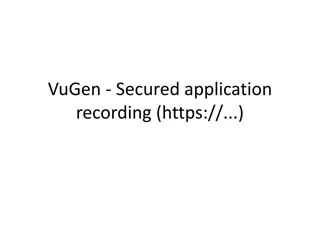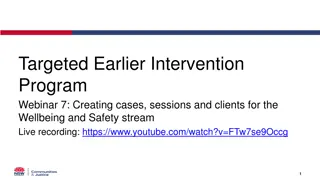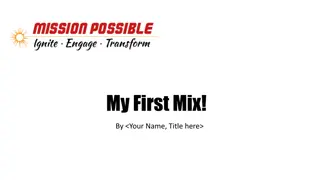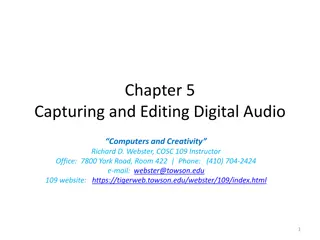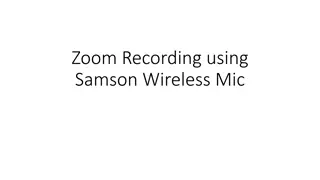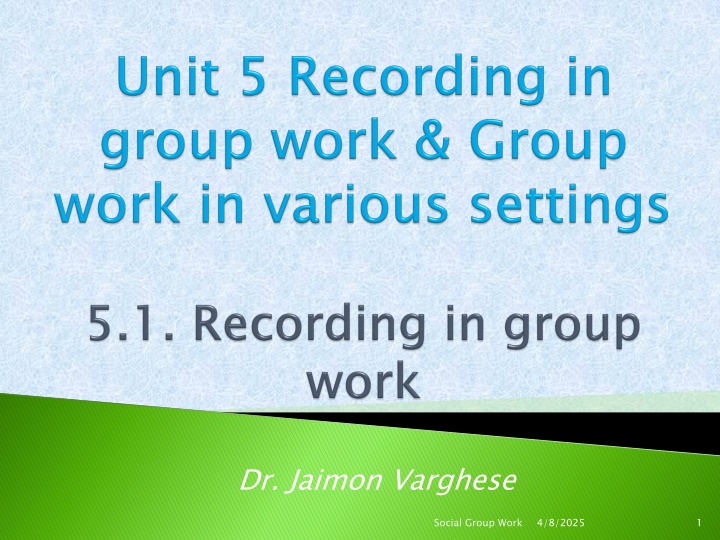
Effective Social Group Work Principles and Recording Importance
Explore the significance of maintaining records in social group work to understand group dynamics, track progress, and facilitate effective interventions. Learn about key principles and techniques essential for successful social group work practice.
Download Presentation

Please find below an Image/Link to download the presentation.
The content on the website is provided AS IS for your information and personal use only. It may not be sold, licensed, or shared on other websites without obtaining consent from the author. If you encounter any issues during the download, it is possible that the publisher has removed the file from their server.
You are allowed to download the files provided on this website for personal or commercial use, subject to the condition that they are used lawfully. All files are the property of their respective owners.
The content on the website is provided AS IS for your information and personal use only. It may not be sold, licensed, or shared on other websites without obtaining consent from the author.
E N D
Presentation Transcript
Dr. Jaimon Varghese Social Group Work 1 4/8/2025
Importance Principles Structure Techniques
"Record" means any document or other source of information compiled, recorded or stored in written form or on film, or by electronic process, or in any other manner. The process of putting in writing and keeping on file relevant information about the client; the problem; the prognosis; the intervention; the progress of treatment; the social, economic, and health factors contributing to the situation and the procedures for termination or referral (Social Work Dictionary, 1995).
Records helps the group worker to understand the group. Provides evidences of growth and change in the members and in the group worker himself Recording helps the worker to do more effective job with his group.
Through records the worker can see the development of skills and social attitudes. Through records the worker gains knowledge of special problems in the groups. Record of source of future planning. Records are the source of information for other workers.
Evidence (permanent) of facts gathered, assessment, intervention and outcome On-going essential information Work / program evaluation Critically reviewing the work done and improve own practice Facilitating the follow up (by others) Work evaluation Revision
The principle of flexibility The principle of selection The principle of read-ability Principle of confidentiality The principle of worker acceptance
A. Information about the Group B. Purpose of the Group or Meeting C. Group Process at the Meeting D. Analysis of the Group Meeting E. Plan for the Group s Next Meeting F. Analysis of the Group / Social Worker s Practice
Information about the Group Information about the Group A. A. Group Name or Type Meeting Number Date Group Members present:
B. Purpose of the Group or Meeting Write a brief statement on the overall purpose of the group Write a concise statement about the goals of the meeting of the group being recorded. How were these goals perceived by the group? How did you perceive these goals? What are the similarities or differences between the group s perception of these goals and yours? B. Purpose of the Group or Meeting
C. Group Process at the Meeting Initial Observations Describe briefly, in general terms, the physical and emotional climate at the beginning of the group meeting. Describe briefly your initial impressions of the attitudes and feelings of the group members at the beginning of the meeting. Describe any significant changes in the appearance or feelings or attitudes f the group members since the last meeting. C. Group Process at the Meeting Initial Observations
Group Member Interaction (Group Process) Describe what went on within the group during its meeting. For example: Describe the means of interaction, e.g., program activity, discussion, debate, tasks, etc. Describe the feeling reactions of the members to this interaction. Describe your feeling reactions to this interaction. Group Member Interaction (Group Process)
Group Member Interaction (Group Process) Describe the effectiveness, vitality, and responsibility of the group s members during the interaction. Describe your role in the group s interaction. Describe the ways the group moved toward attainment of its goals Describe how the group s members dealt with obstacles to attainment of the meeting s goals. Group Member Interaction (Group Process) Describe how the group s members dealt with obstacles to attainment of the meeting s goals.
D. Analysis of the Group Meeting Describe your understanding of the nature of the interaction of the group members, including you, at this group meeting. Indicate the theoretical or other knowledge, learned in you other courses, that helps you to understand the process and content of this group meeting. On the basis of your analysis, what is your current assessment of: The stage of the group s development; The commitment of the group members to the group s purpose; The climate and tone of the group; If relevant, discuss specific roles played by individual group members and how they impact the group process. D. Analysis of the Group Meeting
E. Plan for the Groups Next Meeting Write a brief statement of the plan for the next meeting of the group. Explain how the members of the group, including you, arrived at this plan. Explain how the plan relates to the purpose of the group. Describe what you and the other group members are to do prior to, and in preparation for, the next group meeting. E. Plan for the Group s Next Meeting
F. Analysis of the Group / Social Worker s Practice Discuss your use of social work practice knowledge and skills during the group meeting. What specific social work skills and/or techniques, used in your practice courses, how it has helped for group meeting? What were the strengths and weaknesses in your practice during the group meeting? F. Analysis of the Group / Social Worker s Practice
(1) When we record a process we write about persons and their response to each other in a given situation (Individuals working together in group situations) (2) We write about the type and extent of participation of persons working together to solve a problem.
(3) We put down the origin of ideas and the development of ideas, including acceptance and rejection by persons involved. (4) We put down exactly what the executive does, what he thinks, feels and hopes to accomplish. (5) We put down movement, growth and change of individual and the group as a whole.
(6) Relationships between individuals as reflected by their participation. (7) We write about the relationships between groups and the formal and informal communication that takes place (Interaction within the group and between groups). (8) The worker who is exercising a helping role
Focus Group Discussion Focus Group Interviews Scenario Analysis Ethnographic method SARAR (Self esteem, Associative Strength, Resourcefulness, Action Planning, Responsibility for follow- through)
Problem solving methodology, such as DRIVE (Define, Review, Identify, Verify, Execute) Process mapping Process flowcharting Force field analysis Cause & effect diagrams CEDAC Cause and Effect Diagram with the Addition of Cards Brainstorming Q Sorts (ranking the stimulus factors)
Pareto analysis (20% work - 80 % benefit) Statistical process control (SPC) Control charts Check sheets Bar charts Scatter diagrams Matrix analysis Dot plot or tally chart Histograms
http://drjayeshpatidar.blogspot.in/2015/10/johari- window.html http://socialworkbhu.blogspot.in/2013/12/recording- in-social-group-work.html http://www.effectivemeetings.com/teams/teamwork/crei ghton.asp http://siteresources.worldbank.org/INTCDD/Resources/S Atools.pdf http://www.businessballs.com/dtiresources/TQM_proces s_improvement_tools.pdf Trecker B Harleigh (1950) Group Process in Administration, New York: Woman s Press, (rev. Ed.) Social Group Work 23 4/8/2025
Social Group Work 24 4/8/2025







